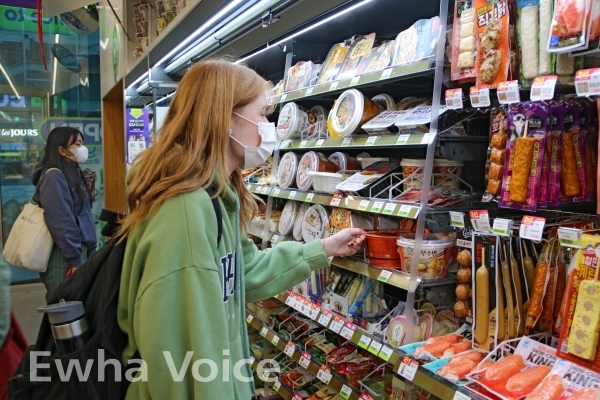
According to the Korea Vegan Union, the population of vegans in Korea this year rose to about 2.5 million, and the number is still gradually increasing. More people are directing attention toward veganism for many reasons such as ethics, sustainability, health, and religion. This phenomenon is readily found among college students, too.
To reflect the vegan or vegetarian students’ preferences, Ewha has also been making efforts to provide suitable options. For example, when the Student Service Center distributed slices of pizza to students on Sept. 1, a vegan option was provided for vegetarian students alongside the non- vegetarian one.
However, some vegetarian students still struggle to find proper places or menus to eat, especially because none of the school dining halls, including the Jinseonmi-gwan Cafeteria, Helen Hall Cafeteria, Engineering Cafeteria, Hanwoori Cafeteria, and E-House Cafeteria, offer vegetarian menus.
Taylor Harper, an exchange student from the Queensland University of Technology majoring in Accounting and Taxation Law who came to Korea this August, shared her experience as a vegan at Ewha.
Deciding to become a vegan due to the influence of her boyfriend who also follows a plant-based diet, Harper has been sustaining a vegan lifestyle starting six years ago.
Regarding vegan options at Ewha, Harper stated that she had trouble finding proper places to eat on campus, comparing the situation with that of her home university.
“As my university has a smaller campus than Ewha, there is a food court instead of multiple cafeterias,” she said. “However, it has a few different restaurants with vegan options available for students.”
Harper further stressed that it is challenging for her to make food as she lives in I-House, the Ewha dormitory that does not have a kitchen. Even though there are microwaves and toaster ovens on every floor and four stoves in each building, it takes more than an hour for her to cook as there are hundreds of students residing in I-House. However, despite this inconvenience, Harper tries to prepare meals in bulk and eat for a week since eating outside every time costs a lot more than making her own meal.
Harper also tried looking for something to eat at convenience stores on campus. She has purchased some vegan-certified products at the convenience store before, but they were usually not in stock the next time she visited.
When asked about the improvements Ewha can apply, Harper suggested connecting the vegan menus to the characteristics of Korean food.
Harper observed that even though some of the Korean food does not seem to contain meat in it, they were not vegan most of the time, as the soup is based on animal ingredients such as beef or seafood. In this regard, she suggested that cafeterias could come up with plant-based menus, furtherallowing diners to add their meat of choice accordingly.
“Although there is not a large vegan population in Korea, it is still growing, and in my opinion, at least one of the school cafeterias could offer a vegan option,” she said.
Cho Hye-min, a senior majoring in the Division of Design, also shared her bumpy experience as a pescatarian.
Pescatarians eat seafood, dairy, and eggs, which allows more options than vegans. Nevertheless, she still struggles to find places she can eat.
“Although Ewha Coop provides some vegan-certified instant food such as packaged soup, protein shakes, and frozen food, those are not enough to make a whole meal,” she said. “This leaves vegetarian students with no choice but to eat outside the campus every day.”
Cho stated that the utmost priority is adopting vegan options at school cafeterias. Since most of the restaurants are concentrated near the Main Gate, she figured it could be even more difficult for vegetarian students who take classes far away from the Main Gate to find something to eat.
Jang Eun-kyung, the nutritionist of the Jinseonmi-gwan Cafeteria, remarked that she tries to include plant-based dishes at least once a day when planning out the menus. However, she added that this is only for the balanced intake of nutrients such as pairing one animal-based dish with one plant-based dish.
Concerning the implementation of vegetarian menus, Jang replied that providing biased diets simply for the minority of vegetarians could be difficult as there are non-vegetarian diners as well. However, Jang further commented that chances are the cafeteria might be able to reflect students’ opinions as they will always welcome students’ suggestions.

